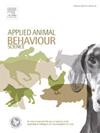Validation of the monash dog owner relationship scale (MDORS) for Brazilian Portuguese and factors influencing dog-owner relationships
IF 2.2
2区 农林科学
Q1 AGRICULTURE, DAIRY & ANIMAL SCIENCE
引用次数: 0
Abstract
The Monash Dog Owner Relationship Scale (MDORS) is a multidimensional scale that assesses the dog-owner relationship through 28 items distributed across three subscales: Dog-Owner Interaction (DOI), which evaluates shared activities, Perceived Emotional Closeness (PEC), which assesses the affectional bond between owner and dog, and Perceived Costs (PC), which analyzes ownership challenges. The present study validated MDORS in Brazilian Portuguese and analyzed factors associated with the dog-owner relationship. To achieve this, a questionnaire was administered in person to 501 randomly selected dog owners in a Brazilian municipality. The validation process included independent translations of the original scale, a pre-test, a pilot study, and exploratory and confirmatory factor analyses. The association between the MDORS dimensions and the explanatory variables was analyzed by means of Gamma models. The validated version has 24 items in the three dimensions, with good fit (comparative fit index = 0.96; root mean square error of approximation = 0.04), excellent test-retest reliability for DOI (0.92), and good test-retest reliability for PEC (0.84) and PC (0.79). In the DOI dimension, higher scores (more positive relationship between owner and animal) were associated with dogs of defined breeds and with a more adequate adoption of the responsible companion animal guardianship (RCAG) score, while lower scores were related to owners’ low level of schooling, unneutered dogs, and medium/large-sized dogs. In the PEC dimension, higher scores were observed in owners who had more than two dogs, dogs of defined breeds, and the RCAG score. In the PC dimension, owners of female dogs obtained higher scores. Owning many cars was associated with lower PEC and PC scores. The Brazilian version of the MDORS proved to have adequate validity and reliability. Thus, the validated scale is suitable for in-person application to assess the dog-owner relationship. The associations found, in turn, are useful to subsidize animal welfare initiatives and public health actions.
莫纳什狗主关系量表(MDORS)在巴西葡萄牙语中的验证以及影响狗主关系的因素
莫纳什狗主人关系量表(MDORS)是一个多维度量表,通过28个项目来评估狗主人的关系,这些项目分布在三个子量表中:狗主人互动(DOI),评估共同的活动,感知情感亲密(PEC),评估主人和狗之间的情感联系,以及感知成本(PC),分析所有权挑战。本研究验证了巴西葡萄牙人的MDORS,并分析了与狗主人关系相关的因素。为了实现这一目标,研究人员亲自对巴西某城市随机选择的501名狗主人进行了问卷调查。验证过程包括原始量表的独立翻译、预测试、试点研究以及探索性和验证性因素分析。通过Gamma模型分析了mors维度与解释变量之间的关系。经验证的版本在三个维度中有24个条目,具有较好的拟合性(比较拟合指数= 0.96;近似均方根误差= 0.04),DOI重测信度为0.92,PEC重测信度为0.84,PC重测信度为0.79。在DOI维度中,得分越高(主人与动物之间的关系越积极)的狗是特定品种的狗,采用负责任的伴侣动物监护(RCAG)得分越充分,而得分越低的狗是主人受教育程度低、未绝育的狗和中型/大型狗。在PEC维度上,拥有两只以上狗的主人、特定品种的狗和RCAG得分较高。在PC维度上,养母狗的主人得分更高。拥有多辆汽车与较低的PEC和PC得分有关。巴西版本的MDORS被证明具有足够的有效性和可靠性。因此,经验证的量表适合于亲自应用于犬主关系的评估。这些协会反过来又有助于资助动物福利倡议和公共卫生行动。
本文章由计算机程序翻译,如有差异,请以英文原文为准。
求助全文
约1分钟内获得全文
求助全文
来源期刊

Applied Animal Behaviour Science
农林科学-行为科学
CiteScore
4.40
自引率
21.70%
发文量
191
审稿时长
18.1 weeks
期刊介绍:
This journal publishes relevant information on the behaviour of domesticated and utilized animals.
Topics covered include:
-Behaviour of farm, zoo and laboratory animals in relation to animal management and welfare
-Behaviour of companion animals in relation to behavioural problems, for example, in relation to the training of dogs for different purposes, in relation to behavioural problems
-Studies of the behaviour of wild animals when these studies are relevant from an applied perspective, for example in relation to wildlife management, pest management or nature conservation
-Methodological studies within relevant fields
The principal subjects are farm, companion and laboratory animals, including, of course, poultry. The journal also deals with the following animal subjects:
-Those involved in any farming system, e.g. deer, rabbits and fur-bearing animals
-Those in ANY form of confinement, e.g. zoos, safari parks and other forms of display
-Feral animals, and any animal species which impinge on farming operations, e.g. as causes of loss or damage
-Species used for hunting, recreation etc. may also be considered as acceptable subjects in some instances
-Laboratory animals, if the material relates to their behavioural requirements
 求助内容:
求助内容: 应助结果提醒方式:
应助结果提醒方式:


